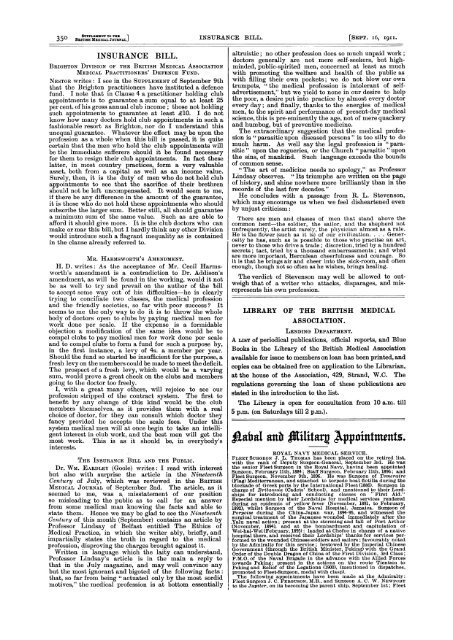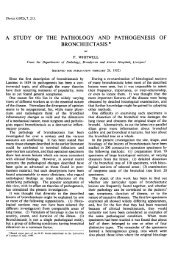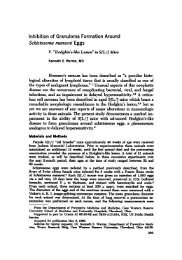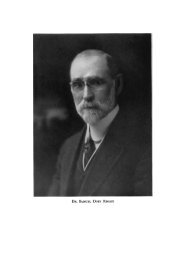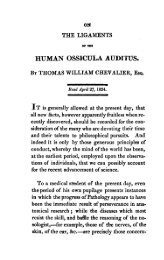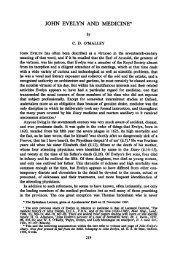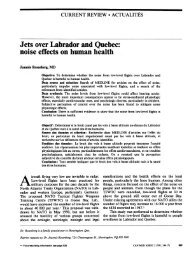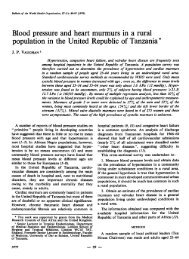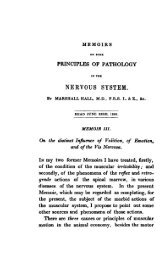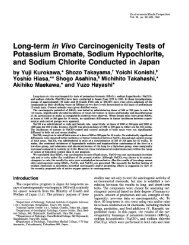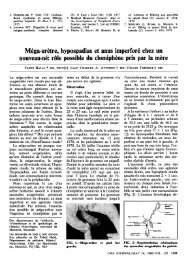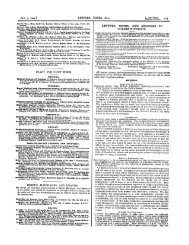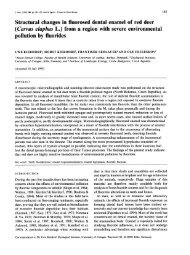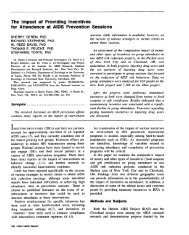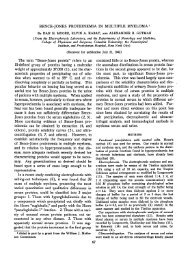SUPPLEMENT TO THU 1350 BBITI8H MZDICAL JOURNALJ INSURANCE BILL. [SEPT. i6, I9II.INSURANCEBILL.BRIGHTON DIVISION OF THE BRITISH MEDICAL AssoCIATIONMEDICAL PRACTITIONERS' DEFENCE FUND.NESTOR writes: I see in the SUPPLEMENT of September 9ththat the Brighton practitioners have instituted a defencefund. I note that in Clause 4 a practitioner holding clubappointments is to guarantee a sum equal to at least 25per cent. of his gross annual club income; those not holdingsuch appointments to guarantee at least £10. I do notknow how many doctors hold club appointments in such afashionable resort as Brighton, nor do I understand thisunequal guarantee. Whatever the effect may be upon theprofession as a whole when this bill is passed, it is quitecertain that the men who hold the club appointments willbe the lminediate sufferers should it be found necessaryfor them to resign their club appointments. In fact theselatter, in most country practices, form a very valuableasset, both from a capital as well as an income value.Surely, then, it is the duty of men who do not hold clubappointments to see that the sacrifice of their brethrenshould not be left uncompensated. It would seem to me,if there be any difference in the amount of the guarantee,it is those who do not hold these appointments who shouldsubscribe the larger sum. Better still, all should guaranteea minimum sum of the same value. Such as are able toafford it should give more. It is the club doctors who canmake or mar this bill, but I hardly think any other Divisionwould introduce such a flagrant inequality as is containedin the clause already referred to.MR. HARMSWORTH'S AMENDMENT,H. D. writes: As the acceptance of Mr. Cecil Harmsworth'samendment is a contradiction to Dr. Addison'samendment, as will be found in the working, would it notbe as well to try and prevail on the author of the billto accept some way out of his difficulties-he is clearlytrying to concifiate two classes, the medical professionand the friendly societies, so far with poor success? Itseems to mie the only way to do it is to throw the wholebody of doctors open to clubs by paying medical men forwork done per scale. If the expense is a formidableobjection a modification of the same idea would be tocompel clubs to pay medical men for work done per scaleand to compel clubs to form a fund for such a purpose by,in the first instance, a levy of 4s. a member per year.Should the fund so started be insufficient for the purpose, afresh levy on the members could be made to meet the deficit.The prospect of a fresh levy, which would be a varyingsum, would prove a great check on the clubs and membersgoing to the doctor too freely.I, with a great many others, will rejoice to see ourprofession stripped of the contract system. The first tobenefit by any change of this kind would be the clubmembers themselves, as it provides them with a realchoice of doctor, for they can consult which doctor theyfancy provided he accepts the scale fees. Under thissystem medical men will at once begin to take an intelligentinterest in club work, and the best men will get themost work. This is as it should be, in everybody'sinterests.THE INSURANCE BILL AND THE PUBLIC.Dr. WM. EARDLEY (Goole) writes: I read with interestbut also with surprise the article in the NineteenthCentury of July, which was reviewed in the BRITISHMEDICAL JOURNAL of September 2nd. The article, as itseemed to me, was a, misstatement of our positionso misleading to the public as to call for an answerfrom some medical man knowing the facts and able tostate them. Hence we may be glad to see the NineteenthCentury of this month (September) contains an article byProfessor Lindsay of Belfast entitled The Ethics ofMedical Practice, in which the writer ably, briefly, andimpartially states the truth in regard to the medicalprofession, disproving the charges brought against it.Written in language which the laity can understand,Professor Lindsay's article is in the main a reply tothat in the July magazine, and may well convince anybut the most ignorant and bigoted of the following facts:that, so far from being " actuated only by the most sordidmotives," the medical profession is at bottom essentiallyaltruistic; no other profession does so much unpaid work;doctors generally are not mere self-seekers, but highminded,public-spirited men, concerned at least as muchwith promoting the welfare and health of the public aswith filling their own pockets; we do not blow our owntrumpets, " the medical profession is intolerant of selfadvertisement,"but we yield to none in our desire to helpthe poor, a desire put into practice by almost every doctorevery day; and finally, thanks to the energies of medicalmen, to the spirit and performance of present-day medicalscience, this is pre-eminently the age, not of mere quackeryand humbug, but of preventive medicine.The extraordinary suggestion that the medical Drofessionis " parasitic upon diseased persons " is too silly to domuch harm. As well say the legal profession is "parasitic" upon the rogueries, or the Church " parasitic " uponthe sins, of mankind. Such language exceeds the boundsof common sense." The art of medicine needs no apology," as ProfessorLindsay observes. " Its triumphs are written on the pageof history, and shine nowhere more brilliantly than in therecords of the last few decades."He concludes with a passage from R. L. Stevenson,which may encourage us when we feel disheartened evenby unjust criticism:There are men and classes of men that stand above thecommon herd-the soldier, the sailor, and the shepherd notunfrequently, the artist rarely, the physician almost as a rule.He is the flower (such as it is) of our civilization. . . . Generosityhe has, such as is possible to those who practise an art,never to those who drive a trade; discretion, tried by a hundredsecrets; tact, tried by a thousand embarrassments; and whatare more important, Herculean cheerfulness and courage. Soit is that he brings air and cheer into the sick-room, and oftenenough, though not so often as he wishes, brings healing.The verdict of Stevenson may well be allowed to outweighthat of a writer who attacks, disparages, and misrepresentshis own profession.LIBRARY OF THE BRITISH MEDICALASSOCIATION.LENDING DEPARTMENT.A LIST of periodical publications, official reports, and BlueBooks in the Library of the British Medical Associationavailable for issue to members on loan has been printed, andcopies can be obtained free on application to the Librarian,at the house of the Association, 429, Strand, W.C. Theregulations governing the loan of these publications arestated in the introduction to the list.The Library is open for consultation from 10 a.m. till5 p.m. (on Saturdays till 2 p.m.).ja l aub ftiIitarg Appoinntnts.ROYAL NAVY MEDICAL SERVICE.FLEET SURGEON J. L. THOMAS has been placed on the retired list,with the rank of Deputy Surgeon-General, September 3rd. He wasthe senior Fleet Surgeon in the Royal Navy, having been appointedSurgeon, February 11th, 1884; Staff Surgeon, February 11th, 1896; andFleet Surgeon, November 9th, 1896. He was Surgeon of Temeraire(Flag) Mediterranean, and attached to torpedo boat flotilla during theblockade of Greek ports by the International Fleet (1886). Surgeon incharge of Britannia (Cadets' School), and mentioned to their Lordshipsfor introducing and conducting classes on " First Aid."Especial mention by their Lordships for medical services renderedduring an epidemic of yellow fever (November, 1891, to February,1892), whilst Surgeon of the Naval Hospital, Jamaica. Surgeon ofPorpoise during the China-Japan war, 1894-95, and witnessed thesurgical treatment of the Japanese wounded immediately after the.Yalu naval action; present at the storming and fall of Port Arthur(November, 1894), and at the bombardment and capitulation ofWei-hai-Wei (February, 1895): landed at Chefoo in charge of a nativehospital there, and received their Lordships' thanks for services performedto the wounded Chinese soldiers and sailors; favourably notedby the Admiralty for this service; bestowed by the Imperial ChineseGovernment (through the British Minister, Peking) with the GrandOrder of the Double Dragon of China of the First Division, 3rd Class;P.M.O. of the Naval Brigade in the advance with the Allied Forcestowards Peking; present in the actions on the route Tientsin toPeking and Relief of the Legations (1900), (mentioned in dispatches,promoted to Fleet-Surgeon, medal with clasp).The following appointments have been made at the Admiiiralty:Fleet Surgeon J. C. FERGUSON, M.B., and Surgeon A. C. W. NEWPORTto the Japiter, on its becoming the parent ship, September 1st; Fleet
F1EPT. i6, 1917.] VACANCIES AND APPOINTMENTS. E lPPLUMXNT TO THU IBnrriTSH MMmDICA JoussL 35DSurgeon A. KIDD to the Glory, September 7th; Surgeon E. R. TOWN-END to the Done7al, September 7th; Fleet Surgepons J. D. HUGHES,J. McELWEE, M.D., G. T. BISHOP, and L. T. REID; Staff Surgeons E.FOLLIOTT, A. J. LAURIE, J. VERDON, L. M. MORRIS, R. H. ATKINS, M.B.,and M. W. IREDELL, and Surgeons W. R. HARRISON, R. F. MACMAHON,G. H. S. MILLN, M.B., A. D. C. CUMMINS, G. MOIR, and J. MCCUTCHEON,all to the President, additional, for Civil Hospital Course, to join theRoyal Naval College, October 2nd; Fleet Surgeon E. R. D. FASKEN, tothe Devonshire, October 2nd; Fleet Surgeon A. X. LAVERTINE to theTerrible, October 2nd; Fleet Surgeon E. A. SHAW, M.B., to the Antrim,October 2nd; Fleet Surgeon B. F. PARISH to the Actaeon, October 2nd;Staff Surgeon E. D. J. O'MALLEY to the Amethyst, October 2nd;Surgeon A. R. DAVIDSON, M.B., to the Indefatigable, October 2nd;Surgeon R. H. ST. B. E. HuGHES to the New Zealand, additional, forthe Portsmouth Subdivision of the Home Fleet, October 2nd; SurgeonJ. D. KEIR to the Venzerable, October 2nd; Surgeon G. W. M. CUSTANcEto the Pembroke, additional, for disposal, undated, and for ChathamHospital, October 2nd; Staff Surgeon W. E. MATHEW to the Forth,September 13th; Staff Surgeon J. R. L. PAGE to Devonport Dockyard,September 28th; Staff Surgeon G. C. C. Ross, M.B., to the Vivid,additional, for disposal, September 28th.ARMY MEDICAL SERVICE.ROYAL ARMY MEDICAL CORPS.CAPTAIN H. H. KIDDLE is placed temporarily on the half-pay list onaccount of ill health, September 2nd. He was appointed Lieutenant,Indian Medical Service, September 1st, 1902, and Captain, September1st, 1905; he was transferred to the Royal Army Medical Corps,December 18th, 1907.INDIAN MEDICAL SERVICE.LIEUTENANT-COLONEL P. HEHIR, M.D., assumed charge as OfficiatingPrincipal Medical Officer, Burma Division, on August 1st.TERRITORIAL FORCE.ROYAL ARMY MEDICAL CORPS.Attached to Units other than Medical Units.-Lieutenant JOHNLEACH, M.B., to be Captain, May 18th, 1911. Major W. C. BEATLEY,M.D., resigns his commission, retaining his rank and uniform,September 9th.COLONIAL MEDICAL SERVICES.THE following changes have been notified by the Colonial Office:WEST AFRICAN MEDICAL STAFF.Retiremsent.-J. B. H. DAVSON, M.R.C.S.Eng., L.R.C.P.Lond., SeniorMedical Officer, Sierra Leone, retires on pension.Promotions.-J. P. FAGAN, F.R.C.S., L.R.C.P., L.M.Irel., D.P.H.Dub.,Deputy Principal Medical Officer, Northern Nigeria, to be PrincipalMedical Officer, Northern Nigeria. F. G. HOPKINS, M.D., B.Ch.Dub.,Deputy Principal Medical Officer, Southern Nigeria, to be PrincipalMedical Officer, Gold Coast. F. MANNING, L.R.C.S., L.R.C P.Irel.,Senior Medical Officer, Northern Nigeria, to be Deputy PrincipalMedical Officer, Northern Nigeria. E. H. TWEEDY, L.R.C S., L.R.C.P.,L.M.Irel., Provincial Medical Officer, Northern Territories of the GoldCoast, to be DeputyPrincipal Medical Officer, Gold Coast.Reappointments.-R. H. BRIERLEY, L.R.C.P., L.R.C.S.Edin.,L.F.P.S.Glas., D.P.H., formerly a Medical Officer in Southern Nigeria,has been reappointed to the staff.Death.-H. G. LEWER, L.R.C.S., L.R.C.P.Edin., L.F.P.S.Glas.,Medical Officer, Northern Nigeria.New Appointments.-The following gentlemen have been selected forappointment to the staff :-L. W. DAVIES, M.D., Ch.B.Edin., NorthernNigeria. J. B ALEXANDER, M.B.. Ch.B.Edin., D.P.H.Cantab., GoldCoast.OTHER COLONIES AND PROTECTORATES.W. H. BOMFORD, L.R.C S., L.R.C.P.Irel., has been selected forappointment as a Medical Officer in Fiji. W PARSONS, M.R.C.S.Eng.,L.R.C.P Lond., has been selected for appointment as Medical Officerin charge of the Quarantine Station at Singapore E. SUTCLIFFE,M.R.C.S.Eng., L.R.C.P.Lond., has been selected for appointment asa Supernumerary Medical Officer in the Leeward Islands.Vital Statistirs. -HEALTH OF ENGLISH TOWNS.IN seventy-seven of the largest English towns 7,750 births and 5.889deaths were registered during the week ending Saturday last, September9th. The annual rate of mortality in these towns, which hadbeen 20.9, 21.2, and 20.6 pmer 1,000 in the three preceding weeks, fell lastweek to 19.0 per 1,000. In London the death-rate last week did notexceed 17.4 per 1,000, against 19.1, 19.0, and 17.6 in the three previousweeks. Among the seventy-six other large towns the death-rates lastweek ranged from 9.4 in Hastings, 10.6 in Barrow-in-Furness, 11.2 inWallasey, 11.8 in Derby and in Halifax, and 12.2 in Croydon to 26.5 inHull, 27.9 in Liverpool and in Burnley, 28.5 in Aston Manor, 28.6in' Stoke-on-Trent. and 33.1 in Sunderland. Enteric fever causeda death-rate of 1.2 in Birkenhead and 1.8 in Wigan; measlesof 2.2 in Wolverhampton; diphtheria of 1.5 in Coventry; anddiarrhoea and enteritis (of children under 2 years of age) of 10.8 inSt. Helens, 10.9 in Stoke-on-Trent, 11.8 in Aston Manor, 13.2 in Grimsby,13.5 in Merthyr Tydfil, and 13.7 in Burnley. The mortality fromwhooping-cough and scarlet fever showed no marked excess in any ofthe large towns, and no fatal case of small-pox was registered duringthe week. Of the 5,889 deaths in the seventy-seven towns last week,the causes of 24, or O.4 per cent., were not certified either by a registeredmedical practitioner or by a coroner after inquest, and included 5 inLiverpool, 4 in Birllmingham, and 2 in London. The number of scarletfever patients under treatment in the Metropolitan Asylums Hospitalsand the London Fever Hospital, which had been 1,388, 1,352, and 1,327at the end of the three preceding weeks, rose to 1,349 at the end of theweek under notice; 217 new cases were admitted during the week,against 149, 132, and 168 in the three preceding weeks.HEALrH OF SCOTTISH TOWNS.IN eight of the largest Scottish towns 758 births and 536 deaths wereregistered during the week ending Saturday last, September 9th. Theannual rate of mortality in these towns, which had been 15.5 and 17.2in the two preceding Nveelts, declined to 16.4 in the week under noticeand was 2.6 per 1,000 below the mean rate during the same period inthe large English'towns. Among the several Scottish towns the deathrateslast week ranged from 11.1 in Paisley and 12.2 in Edinburgh to19.4 in Greenock and 20.1 in Aberdeen. The mortality from theprincipal epidemic diseases averaged 3.2 per 1,000, and was highest inDundee and Perth. The 262 deaths from all causes registered inGlasgow included 40 (of children under 2 years of age) from diarrhoeaand enteritis, 4 from whooping-cough, 3 from diplhtheria, 2 frommeasles, and 1 from enteric fever. Twelve deaths from infantilediarrhoea were recorded in Dundee, 4 in Aberdeen, 3 in Greenock, and3 in Perth; 2 deaths from scarlet fever in Aberdeen; and 2 deathsfrom diphtheria in Dundee and 2 in Leith.HEALTH OF IRISH TOWNS.DUIRING the week ending Saturday, September 2nd, 609 births and462 deaths were registered in the twenty-two principal urban districtsof Ireland, as against 623 births and 426 deaths in the preceding period.The annual death-rate in these districts, which had been 17.1, 19.4, and19.3 per 1,000 in the three preceding weeks, rose to 21.0 per 1,000 in theweek under notice, this figure being 0.4 per 1,000 higher than the meanaverage death-rate in the seventy-seven English towns for the correspondingperiod. The figures in Dublin and Belfast were 25.8 and 18.6respectively, those in other districts ranging from 4.2 in Drogheda and4.4 in Newry to 49.6 in Kilkenny and 57.2 in Newtownards, while Corkstood at 24.5, Londonderry at 12.8, Limerick at 17.7, and Waterford at9.5. The zymotic death-rate in the twenty-two districts averaged 6.9pei 1,000, as against 6.1 in the preceding week.During the week ending Saturday, September 9th, 598 births and 487deaths were registered in the twenty-two principal urban districts ofIreland, as against 609 births and 462 deaths in the preceding period.The annual death-rate in these districts, which had been 19.4,19.3, and21.0 per 1,000 in the three preceding weeks, rose to 22.1 per 1,000 in theweek under notice, this figure being 3.1 per 1,000 higher than the meanaverage death-rate in the seventy-seven English towns for the correspondingperiod. The figures in Dublin and Belfast were 27.1 and 19.7respectively, those in other districts ranging from 3.9 in Galway and4.2 in Drogheda to 27.5 in Armagh and 31.9 in Wexford, while Corkstood at 25.2, Londonderry at 16.6, Limerick at 17.7, and Waterford at26.6. The zymotic death-rate in the twenty-two districts averaged 5.9per 1,000 as against 6.9 in the preceding week.ffarauiez antbpotitmunts.This list 'of vacancies is compiled from our advertisement- columns,where full particulars will be found. To ensure notice in thiscolumn, advertisements must be received not later than the first poston Wednesday morning. VACANCIES.BANGOR: CARNARVONSHIRE AND ANGLESEY INFIRMARY.-House-Surgeon. Salary, £100 per annum.BEDFORD COUNTY HOSPITAL.-1) House-Physician. Salary, £80per annuim. (2) Male Assistant House-Surgeon. Salary, £80per annumBIRKENHEAD AND WIRRAL CHTLDREN'S HOSPITAL.-MaleHouse-Surgeon. Honorarium, £100 per annum.BODMIN: CORNWALL COUNTY ASYLUM. -Third AssistantMedical Officer (male). Salary, £140 per annulm.BRISTOL ROYAL INFIRMARY.-41) House-Surgeon. Salary, £100per annum. (2) Resident Casualty Officer. Salary at the rate of£50 per annum.BRITISH LYING-IN HOSPITAL, Endell Street, W.C.-(1) ResidentMedical Officer. Salary at the rate of £50 per annum. (2) Physiciansto Out-patients.CANCER HOSPITAL (FREE), Fulham Road, S.W.-House-Surgeon.Salary, £70 per annum.CHESTERFIELD AND NORTH DERBYSHIRE HOSPITAL. -House-Physician. Salary, £70 per annum.COUNTY OF LONDON.-Medical Officer of Health. Salary commencing at £1,250 psr annum.COVENTRY AND WARWICKSHIRE HOSPITAL.-Junior House-Surgeon. Salary, £80 per annum.DEVONPORT: ROYAL ALBERT HOSPITAL.-(1) House-Surgeon(male); salary, £125 per annum. (2) Assistant House-Surgeon;salary at the rate of £75 per annum.DUNDEE: UNIVERSITY COLLEGE.-Assistant in the Departmentof Physiology. Salary, £150 per annum.DUNFERMLINE: THE CARNEGIE DUNFERMLINE TRUST.-Assistant Medical Officer. Salary at the rate of £250 per annum.EAST LONDON HOSPITAL FOR CHILDREN, Shadwell, E.-House-Surgeon (male). Salary at the rate of £75 per annum.EDINBURGH SCHOOL BOARD.-Assistant Medical Officer. Salaryat the rate of £250 per annum.EDMONTON UNION.-Second Assistant Medical Officer (male) at theInfirmary. Salary, £120 per annum.ENNISKILLEN: FERMANAGH COUNTY HOSPITAL -House-Surgeon (male). Salary, £72 per annum.EXETER: ROYAL DEVON AND EXETER HOSPITAL.-House-Physician and Assistant House-Surgeon. Salary at the rate of£60 each per annum.GLASGOW ROYAL ASYLUM.-Junior Assistant Physician. Salaryat the rate of £150 per annum.GUILDFORD: ROYAL SURREY COUNTY HOSPITAL.-AssistantHouse-Surgeon. Salary, £75 per annum.HAMPSTEAD GENERAL AND NORTH-WEST LONDON HOS-PITAL.-House-Physician. Salary at the rate of £70 per annum.HASTINGS: EAST SUSSEX HOSPITAL. - House-Surgeon andAssistant House-Surgeon (males). Salary, £100 and £50 perannum respectively.HOLBORN UNION.-Public Vaccinator for the ClerkenwellDistrict.INVERNESS DISTRICT ASYLUM.-Junior Assistant Physician(male). Salary, £120 per annum.LEAMINGTON: WARNEFORD, LEAMINGTON, AND SOUTHWARWICKSHIRE GENERAL HOSPITAL. - House-Surgeon.Salary, £100 per annum.


